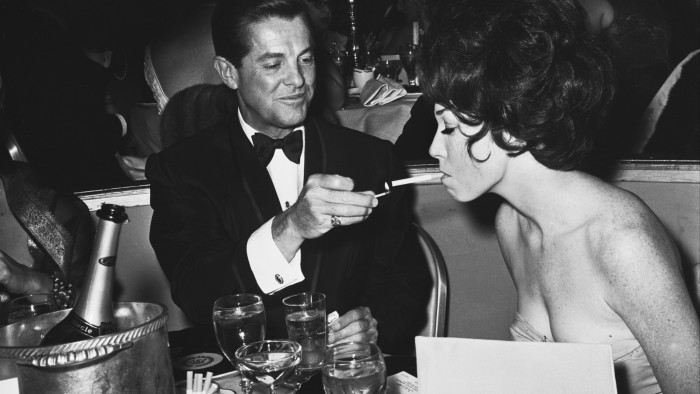Stay informed with free updates
Simply sign up to the Life & Arts myFT Digest — delivered directly to your inbox.
Are you thinking about cutting down a bit? Maybe trying that new app that helps you monitor your alcohol? Perhaps you’re trying to quit that cheeky cigarette you had last night — you know, the one you only have at parties, to be social, after a few glasses of wine?
According to a new report from Finland, that day can’t come too soon. In a peer-reviewed study, published in the Annals of Medicine, it was discovered that bad habits such as heavy drinking, smoking and lack of exercise are associated with declines in health in people as young as 36. The study followed the progress of hundreds of children born in Jyväskylä, Finland, in 1959, collecting data at different stages in their lives.
The results came with various caveats: they were particular to people born in Finland and other western countries in the late 1950s. And future studies would include diet in the research. Nevertheless, the message was a grim one: we should tackle risky health behaviours as early as possible to prevent cumulative damage to both our physical and mental health. It signed off with the cheery consolation that, even if you’ve slightly missed the boat in terms of timings, “adopting healthier habits in mid-life also has benefits for older age.” Well, great.
Thirty-six seems preternaturally youthful to have already cycled through one’s vices and be working for the betterment of one’s future health. Although, as a decade in which many people are having babies, it’s typically a moment when people instinctively make health changes for the good of someone else’s health. Even so, I still felt inviolably healthy in my thirties, still capable of shouldering a skinful and ploughing through on almost zero sleep. The creaks, aches and spasms that accompanied my forties still felt far away.
The Finnish findings seem quite consistent with a far greater health awareness among the youth. There’s compelling evidence that younger generations are already way ahead of us. Successive surveys have found cigarette consumption to be declining across Europe for several years, varying according to sex, age and education level, and with major differences in consumption between EU and non-EU states.
More anecdotally, I am continually astonished by the degree to which Gen Z is focused on its wellbeing. Not so much the long-term habits regarding vices — we all know that smoking is just idiotic — but in the strange pernicious health memes they subconsciously pick up. A current obsession in our house, for example, is set around what time of day one should have a shower: a rash of TikTok videos about “outdoor clothes” and germs have given rise to the importance of the evening cleanse. Numerous other health tics have gone similarly viral, and health advice from random influencers quickly become gospel truths. They are irritatingly convincing: having been told that it’s “disgusting to sit on a bed in jeans that have been worn outside”, it’s hard to dislodge it from your mind.
Inevitably, it must be an adjunct of the pandemic culture that the upcoming generations will be germaphobes. I would hazard also that being locked up for months with no other outlet has made them far more obsessed with diet and food. And this may be a good thing — young people are streets ahead of where I was at the same age on the subject of exercise and nutritional health. And while they might be choking on a mango-scented vape while they do so, they can explain the dangers of B6 or the wonders of magnesium.
But what about those people stuck in the post-36 conundrum, who haven’t quite had the chance to set things right? I’ve shaved my bad habits down to the bare minimum, but perhaps it’s all in vain. If 36 is the new 60, then I’m dangerously old. Should I continue with the rather-too-many-units of alcohol I’m used to, or do I now have to be teetotal?
Thankfully I am reassured by NHS guidance on the benefits of giving up smoking. Repeat after me this mantra: after one year of quitting, the risk of heart attack halves. After 10 years, the risk of death from lung cancer falls to half as well.
The drinking advice is less emphatic, lots of woolly info about feeling more energetic (no kidding), lower blood pressure and saving thousands of calories. And I’m confused even further by another study in the Canadian Journal of Cardiology. Those authors found the consumption of white wine, champagne and fruit might have a cardioprotective effect. They also said it helped to be wealthy, well-educated and active, which I feel triggers a few red flags, but in a study of 502,094 middle-to-older-aged people, the findings suggested that between 40 to 63 per cent of sudden cardiac arrest cases may be avoidable if we drink champagne (or something along those lines).
“One of the study’s most intriguing findings . . . [questions] long-held assumptions about the specificity of red wine’s cardioprotective properties,” say Nicholas Grubic from the University of Toronto, and Dakota Gustafson, from Queen’s University in Ontario. Moreover, “these findings reinforce the idea that the benefits of moderate alcohol consumption may be more complex than previously assumed.”
Given that I was on my third or fourth glass at the precise moment of this revelation, I felt a crossroads had been met. My 36-year-old self appeared before me. “FFS,” she advised me firmly. “Have another round.”
Email Jo at [email protected]
Find out about our latest stories first — follow FT Weekend on Instagram and X, and sign up to receive the FT Weekend newsletter every Saturday morning
